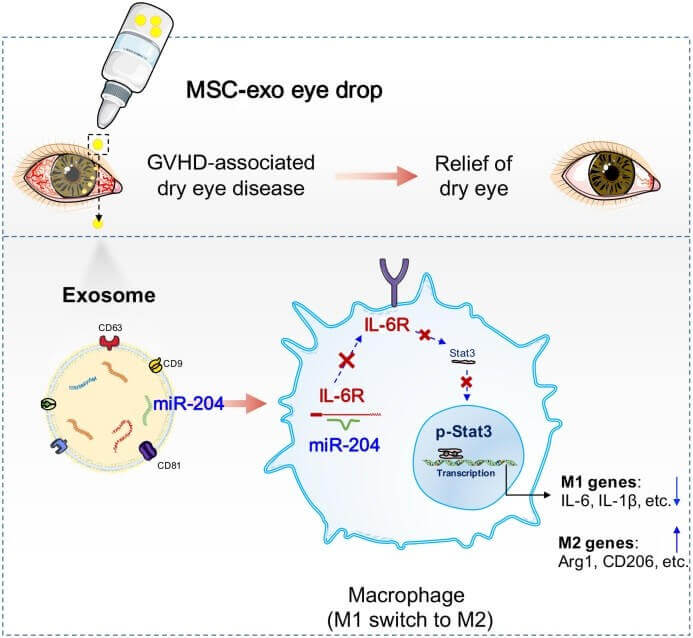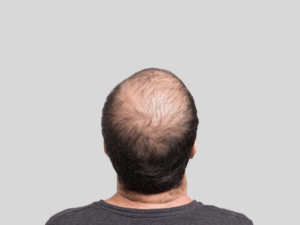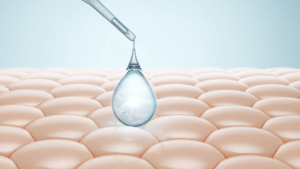Referenced from: Science Advances
Stem cell exosomes have the potential to be used in medical aesthetics to aid in skin repair and regeneration, but did you know that exosomes might also be applied in eye treatments?
A recent study published in Science Advances in 2022 discovered that exosomes can alleviate the side effects of dry eye syndrome caused by GVHD (Graft Versus Host Disease), one of the main complications after transplantation. Mild GVHD can affect the quality of life of patients, while severe GVHD can threaten long-term survival.
Biologically and medically speaking, immune cells activated after transplantation continuously attack hematopoietic tissues and ocular epithelial tissues, including the cornea, conjunctiva, and lacrimal glands, causing widespread inflammation. This leads to a disorder in the ocular immune microenvironment, ultimately resulting in cell apoptosis and worsening eye tissue damage. The effectiveness of current clinical drugs in treatment is limited, and some patients with severe conditions face a lack of effective treatment options.
In a prospective clinical trial, mesenchymal stem cell exosomes (MSC-exo) used as eye drops inhibited inflammation and improved epithelial recovery, showing significant therapeutic effects in both mice and humans. Symptoms of dry eye, including stinging, burning, and redness, were alleviated after treatment, with effects surpassing those of artificial tears. For corneas damaged by inflammation, exosome treatment protected corneal structure through mechanisms such as preventing corneal epithelial degeneration, reducing pro-inflammatory gene expression, and converting M1 pro-inflammatory macrophages into M2 anti-inflammatory macrophages.
This research data further supports the potential of exosomes as a component in the treatment of eye diseases, promising to become the next target for drug development.
2024-05-24
Chronic Kidney Disease (CKD) is increasingly recognized as a significant health concern worldwide. According to a recent report in The Lancet Regional Health, as of 2022, between 9.1% and 13.4% of the global population suffers from CKD.A promising avenue for treating CKD, particularly in reducing
2024-04-24
Risk factors for hearing loss include ear infections, prolonged exposure to high-frequency noise, and unhealthy lifestyle habits, which can cause irreversible damage. In daily life, sounds enter the cochlea as vibrations, where they are transformed into auditory signals by hair cells and then transmitted by
2024-03-27
This groundbreaking study shines a light on the exosomes present in these muscle-secreted humoral factors. This compelling evidence underscores the potential of Myo-EVs in facilitating bone repair and restoring bone health, marking a significant stride in osteoporosis treatment.
2024-03-13
As the exploration of exosomes in clinical settings progresses, there's growing anticipation for their integration with existing treatments like Minoxidil and Finasteride. This innovative approach could herald a more comprehensive and effective solution for tackling male pattern baldness, promising a new era of hair loss
2024-02-02
Overexposure to UV rays stimulates the production of free radicals, leading to wrinkles, spots, and dullness. Therefore, it is essential to use sunscreen and engage in proper skincare to prevent and repair the signs of skin aging.
2024-01-05
Extracellular vesicles, including exosomes and microvesicles, are an important medium for intercellular communication, with nearly all cells secreting these vesicles. The research team compared aging muscle stem cells cultured with young serum to those with young serum depleted of extracellular vesicles, observing the impact of
2023-12-19
Biologically and medically speaking, immune cells activated after transplantation continuously attack hematopoietic tissues and ocular epithelial tissues, including the cornea, conjunctiva, and lacrimal glands, causing widespread inflammation.








